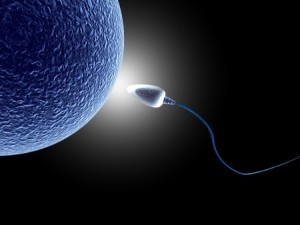
Down Syndrome Awareness Month- Prevent Trisomy 21
 Down Syndrome – also known as Trisomy 21 – is a birth defect affliction happening to a child born with an extra 21 chromosome. Normally, a person has two copies of chromosome 21 – a baby with Down Syndrome has three copies. This common syndrome leads to delayed physical and mental development in babies born to women over 35. Children born with Down Syndrome suffer from medical problems like heart defects and sleep apnea, as well as mental and social development complications.
Down Syndrome – also known as Trisomy 21 – is a birth defect affliction happening to a child born with an extra 21 chromosome. Normally, a person has two copies of chromosome 21 – a baby with Down Syndrome has three copies. This common syndrome leads to delayed physical and mental development in babies born to women over 35. Children born with Down Syndrome suffer from medical problems like heart defects and sleep apnea, as well as mental and social development complications.
Genetic Screening (PGS/NGS) Helps to Prevent Down Syndrome
The Down Syndrome Awareness Month is October and is a national movement focused on helping couples trying to get pregnant understand the risks of chromosomal birth defects. Why does this matter? Our fertility experts prevent birth defects and want to spread awareness about how genetic testing can help prevent Downs Syndrome. Bottom Line: In their role as partners in bringing awareness about Down Syndrome, New Hope Fertility Center NYC has the most advanced genetic testing technology and is dedicated to helping fertility patients reduce their risks of having a child born with a birth defect.
Preimplantation Genetic Testing (PGS, PGD, NGS) in Conjunction With IVF
Preimplantation Genetic Screening (PGS) is the testing of an embryo’s overall chromosomal normalcy prior to being transferred to the patient’s uterus in conjunction with In Vitro Fertilization (IVF). Specifically, PGS identifies the most suitable and healthiest embryo to transfer by detecting chromosomal deficiencies – aneuploidy – an extra or missing chromosome.
Today’s Assisted Reproductive Technology (ART) helps to increase the healthy birth rates of babies through genetic screening. This is because only the healthiest embryos are transferred for implantation during a fresh IVF cycle and/or Frozen Embryo Transfer (FET).
PGS Increases Pregnancy Success Rates Up To 30%
PGS dramatically increases a woman’s chance of conception. Embryo biopsy and screening can increase a patient’s chance of a successful pregnancy by 25 to 30 percent.Read more: Down Syndrome Awareness Month- Prevent Trisomy 21
Increase Your IVF Vocabulary: Infertility Treatment Terms
 During infertility treatment, you will commonly be confronted with unfamiliar acronyms and terms describing your diagnosis and treatment plan. These acronyms and terms may be confusing and can make understanding your diagnosis and treatment challenging. Dr. John Zhang has compiled a list of acronyms and definitions of terms you should familiarize yourself with as you begin your infertility treatment.
During infertility treatment, you will commonly be confronted with unfamiliar acronyms and terms describing your diagnosis and treatment plan. These acronyms and terms may be confusing and can make understanding your diagnosis and treatment challenging. Dr. John Zhang has compiled a list of acronyms and definitions of terms you should familiarize yourself with as you begin your infertility treatment.
Infertility Treatment Terms You Should Know
AMH
Anti-Mullerian Hormone (AMH) is one of the primary indicators of a woman’s egg reserve. The AMH hormone produces egg follicles in a woman’s ovaries. The lower a woman’s level of AMH, the lower the number of eggs she has remaining. A woman’s ovarian reserve is one of the primary measurements of her fertility.
FSH
Follicle Stimulating Hormone (FSH) is one of the primary hormones evaluated as a part of the fertility diagnostic process. FSH is responsible for stimulating ovarian follicles to mature during a woman’s cycle. FSH levels that are outside of normal levels are generally evidence of a low ovarian supply.Read more: Increase Your IVF Vocabulary: Infertility Treatment Terms
Why Opt For ICSI In Conjunction With IVF?
 Intracytoplasmic Sperm Injection (ICSI) is an innovative method of fertilizing eggs in conjunction with In Vitro Fertilization (IVF). By using ICSI in conjunction with IVF, we can greatly increase the chances of achieving a healthy embryo and a successful pregnancy.
Intracytoplasmic Sperm Injection (ICSI) is an innovative method of fertilizing eggs in conjunction with In Vitro Fertilization (IVF). By using ICSI in conjunction with IVF, we can greatly increase the chances of achieving a healthy embryo and a successful pregnancy.
How ICSI in Conjunction with IVF Works
ICSI is an in vitro (laboratory) procedure that involves injecting a single sperm directly into an egg for fertilization. This is a great option for men who would otherwise be considered infertile due to low sperm count, low motility, or other fertility complications.
The sperm can be removed directly from the man’s fresh ejaculate that has been washed and prepared in the laboratory. Once a single sperm has been immobilized, it is retrieved into a micropipette and then injected directly into an egg.
ICSI boasts a very high success rate and has no harmful effect on the resulting embryos. In fact, over 100,000 babies have been born this way.
ICSI is not just for men who are infertile. At New Hope Fertility Center, ICSI is used as a standard ancillary procedure to IVF because it results in higher fertilization rates of the eggs. Higher quality egg fertilization rates results in more high quality embryos.
Sperm Extraction Techniques
For men that do not have enough sperm in their ejaculate, we can still extract the sperm needed to fertilize the eggs through other methods:
- Microsurgery – In many cases, we can retrieve sperm directly from the man’s testicles through a microsurgical process. This surgery is done under local anesthesia and takes just a few minutes. Most men report little to no pain during recovery.
- Fine needle aspiration – This option also extracts sperm from the testicles and is a good fit for men who do not wish to or are unable to undergo surgery. Instead, a thin needle is inserted into the testicle to extract the sperm.
Using testicular sperm for IVF has virtually the same success rates for fertilization as using ejaculated sperm. The only drawback is that testicular sperm does not freeze as well for future use. It is more practical to fertilize eggs with the testicular extracted sperm and freeze the resulting embryos.
Learn More about ICSI in Conjunction with IVF
Dr. Zhang is a highly trained fertility specialist and can answer any questions you may have about the process of ICSI in conjunction with IVF. Here at the New Hope Fertility Center, we offer ICSI to all of our IVF patients at no extra charge. Dr. Zhang will work with you and your partner to design a customized IVF protocol that is most appropriate to your medical history and personal preferences. Call us at 917.525.5496 to schedule your first consultation. We look forward to helping you conceive.
Discover the No. 1 Fertility Preservation Option for Women: Egg Freezing
 Egg freezing – oocyte cryopreservation – is a phenomenal medical technology available for today’s women to preserve their fertility for tomorrow. These women want to ensure they have the ability to be biologically connected to their children in the future. Embryo cryopreservation – using known or donor sperm – is also becoming increasingly popular as a means for women to preserve their ability to have a family.
Egg freezing – oocyte cryopreservation – is a phenomenal medical technology available for today’s women to preserve their fertility for tomorrow. These women want to ensure they have the ability to be biologically connected to their children in the future. Embryo cryopreservation – using known or donor sperm – is also becoming increasingly popular as a means for women to preserve their ability to have a family.
Candidates for Egg Freezing
Egg and embryo freezing is increasingly being sought out by:
- Today’s modern women who are focused on their education and career opportunities
- Women whose circumstances in life are not presently conducive to rearing children
- Women who have not be able to find their life partner
- Women who are facing cancer treatment – chemo or radiation – that could damage the quality of their eggs and/or destroy their ovarian function by sending them into premature menopause
- Women who are undergoing IVF and are likely to produce excessive eggs, but have ethical or religious concerns over freezing embryos
Egg Freezing
By preserving their eggs through oocyte cryopreservation, women can postpone motherhood past their prime childbearing years. Pregnancy success rates using a woman’s egg that has been cryopreserved, thawed and fertilized are comparable to success rates using a fresh egg.
After a woman’s eggs have been harvested through a fresh IVF cycle, they are frozen using an advanced technology known as vitrification. This is a flash-freezing method to ensure the egg is not damaged by ice crystals forming between cells. New Hope Fertility NYC is an international leader in egg freezing technology. Dr. John Zhang was one of the first fertility specialists in the United States to use the vitrification method to freeze eggs and is celebrated for being the first doctor in New York to accomplish a live birth from a frozen oocyte.
There are varied holistic protocols of IVF offered by pioneering IVF Dr. Zhang
When a woman is ready to start her family, the eggs are thawed, fertilized with sperm in vitro and transferred for implantation into her uterine lining.
Internationally Renowned Egg Freezing Doctor
Contact Dr. John Zhang if you interested in preserving your fertility through egg freezing. It is important to work with a fertility specialist who is accomplished in egg freezing technology.
To schedule your one-on-one initial consultation with Dr. John Zhang – call 917.525.5496.
2017’s Candidates for Conventional IVF
The most common treatment for infertility is Conventional IVF (in vitro fertilization). Thanks to innovative IVF ancillary technologies – such as ICSI and PGD/PGS/NGS – Conventional IVF is very successful for the right candidate.
 Candidates for Conventional IVF
Candidates for Conventional IVF
Typical candidates for Conventional IVF:
- Women under 35 who can produce multiple quality eggs
- Women having blocked or damaged Fallopian tubes
- Women who are facing cancer treatment and have little time to cryopreserve their eggs before chemo or radiation treatment
- Couples diagnosed with male factor infertility
Conventional IVF is recommended for women who have failed to achieve a pregnancy after undergoing a series of IUI.
Varied IVF protocols available today:
· Mini-IVF™Read more: 2017’s Candidates for Conventional IVF
Fertility Doctor Treating Secondary Infertility
While it is mainstream for a couple to seek out the help of a fertility doctor after they have tried unsuccessfully to get pregnant for a year, a typical case of secondary infertility can go undiagnosed. Primary infertility is diagnosed when a couple fails to conceive after one year of regular, unprotected sex. For women over 35, this time period is shortened to six months. Secondary infertility is diagnosed when a couple has been successful in conceiving a child, but then is unable to conceive more children.
Dr. John Zhang is renowned for successfully treating couples suffering from secondary infertility. Older men and women considered poor responders are turned down by other fertility clinics offering In Vitro Fertilization (IVF).
Dr. John Zhang welcomes patients representing a challenge, regardless of their potential adverse affect on his pregnancy success rates. The Doctor completed his clinical training at NYU and holds a PhD in IVF from Cambridge. With over two decades of experience in Reproductive Endocrinology, the Doctor is a leading authority performing a vast array of IVF methods.
- Conventional IVF – large dosages of fertility medication are administered to produce 10+ egg follicles for fertilization in vitro
- Mini-IVF™ – minimal dosages of fertility medications are administered to produce between 3 and 5 eggs for fertilization in vitro
- Natural Cycle IVF – no fertility medications are administered and one good natural egg is harvested for fertilization in vitro
Dr. Zhang’s No FSH Restrictions Policy

 It is my strict policy to never turn away women with high FSH levels. Why is this important? Unlike other fertility clinics who refuse to treat women having low egg production due to high FSH levels, I put the patient first at New Hope Fertility NYC. Every patient is unique and deserves to be treated as an individual. Innovative IVF protocols and first-class technology are offered to all women regardless of their FSH level.
It is my strict policy to never turn away women with high FSH levels. Why is this important? Unlike other fertility clinics who refuse to treat women having low egg production due to high FSH levels, I put the patient first at New Hope Fertility NYC. Every patient is unique and deserves to be treated as an individual. Innovative IVF protocols and first-class technology are offered to all women regardless of their FSH level.
How Assisted Hatching Enhances IVF Treatment

 The cutting-edge technique of Assisted Hatching is used during the IVF culturing process to enhance an embryo’s chances of implantation. Why is this IVF ancillary procedure amazing? Assisted Hatching helps couples having a poor prognosis finally achieve a pregnancy through IVF. Typically, these couples develop embryos lacking the capacity to erupt naturally from their shells and attach to the woman’s endometrial lining.
The cutting-edge technique of Assisted Hatching is used during the IVF culturing process to enhance an embryo’s chances of implantation. Why is this IVF ancillary procedure amazing? Assisted Hatching helps couples having a poor prognosis finally achieve a pregnancy through IVF. Typically, these couples develop embryos lacking the capacity to erupt naturally from their shells and attach to the woman’s endometrial lining.
- Assisted Hatching is an ancillary procedure used in conjunction with IVF process
- Assisted Hatching has improved IVF pregnancy success rates in patients having a poor prognosis
Bottom Line: A better chance for a successful IVF pregnancy even for those couples diagnosed as poor responders or difficult cases.Read more: How Assisted Hatching Enhances IVF Treatment
How to Plan Ahead for Travel During IVF Treatment
 Fertility medication is an integral and vital part of In Vitro Fertilization (IVF) treatment. Medication is used to delay the start of a cycle, spur the growth of eggs, and trigger ovulation. In order for an IVF treatment cycle to have the best chance at pregnancy success, it is important that all prescribed fertility medication be taken at the time and dose indicated by your fertility care tam. Failing to do so can result in the IVF cycle being unsuccessful.
Fertility medication is an integral and vital part of In Vitro Fertilization (IVF) treatment. Medication is used to delay the start of a cycle, spur the growth of eggs, and trigger ovulation. In order for an IVF treatment cycle to have the best chance at pregnancy success, it is important that all prescribed fertility medication be taken at the time and dose indicated by your fertility care tam. Failing to do so can result in the IVF cycle being unsuccessful.
Administering IVF Medications While Traveling
Finding the time and place to administer fertility medication can take some maneuvering and coordination.
This is true regardless of your chosen IVF protocol – traditional or holistic.
· Mini IVF
· Natural IVFRead more: How to Plan Ahead for Travel During IVF Treatment
How High Resolution Sperm Selection (HRSS) Treats Male-Factor Infertility
 Any and all negative influence of male-factor infertility must be negated to ensure successful embryo development. Why does this matter? HRSS technology is helping embryologists see, identify, and choose only high quality sperm cells for fertilization of an egg in vitro. With HRSS technology, embryologists are able to better visualize sperm for Intracytoplasmic Sperm Injection (ICSI) administration. Bottom line: Couples who have multiple failed IVF cycles are primary benefactors of HRSS.
Any and all negative influence of male-factor infertility must be negated to ensure successful embryo development. Why does this matter? HRSS technology is helping embryologists see, identify, and choose only high quality sperm cells for fertilization of an egg in vitro. With HRSS technology, embryologists are able to better visualize sperm for Intracytoplasmic Sperm Injection (ICSI) administration. Bottom line: Couples who have multiple failed IVF cycles are primary benefactors of HRSS.
HRSS Technology Overview
New Hope Fertility Center NYC is one of only a few fertility treatment providers to offer HRSS technology. Look: HRSS optimizes the sperm selection process for improving the success of ICSI.
At 6000 x magnification – using Differential Interference Contrast (DIC) microscopy – it is possible for embryologists to see finer morphological details of sperm. Using conventional 500 x magnification, these details would go unnoticed.
The best part? By viewing sperm cells at 6000 x magnification, lab technicians can identify quality sperm cells that are optimum for fertilization of a healthy egg.
Once optimum sperm cells have been identified, a two-pronged process takes place.
- Selection
- Injection
Once the quality sperm cells are selected and separated using HRSS, they are injected into the egg for fertilization. Each egg receives a single sperm injection.
- Reduces chances of a negative impact a sperm can have on a perfectly healthy egg
- Removes any negative influence that male-factor infertility may have on successful embryo development
- Increase the chances of a viable pregnancy
Read more: How High Resolution Sperm Selection (HRSS) Treats Male-Factor Infertility

